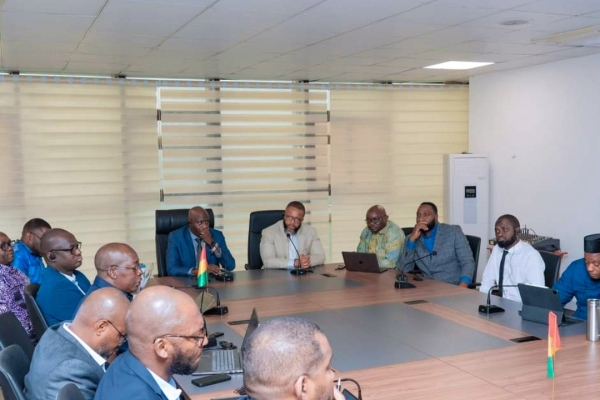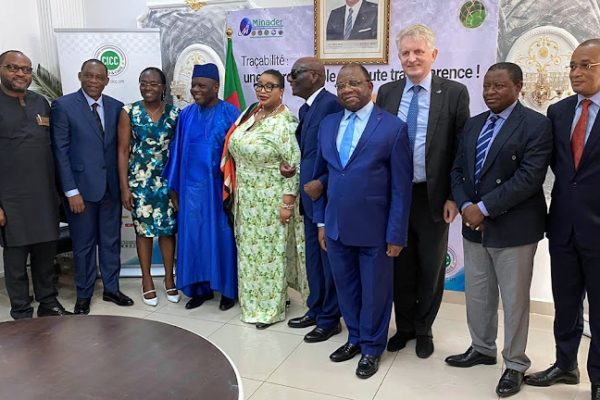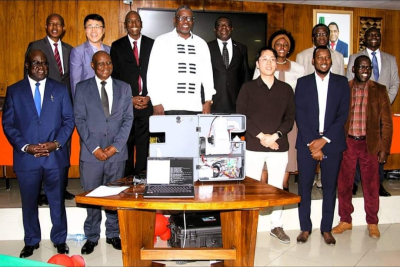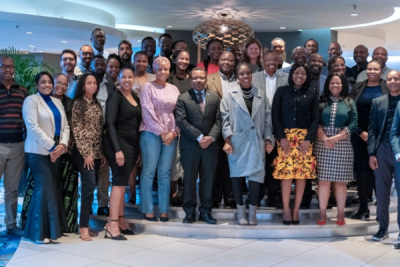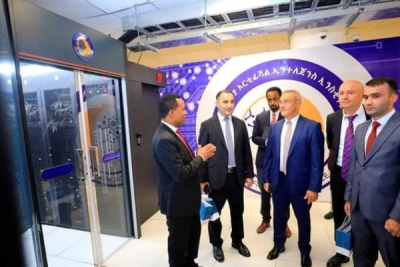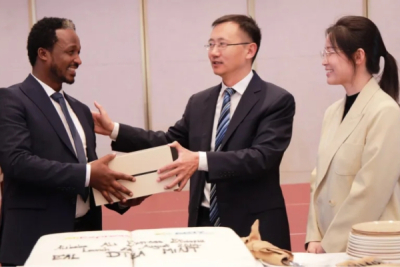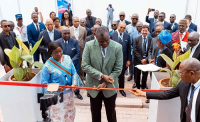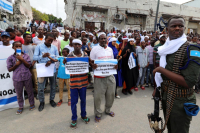
Tech (805)
African nations are increasingly forming partnerships to accelerate their digital progress. New initiatives are emerging rapidly, building momentum towards a digitally transformed continent.
A Sierra Leonean delegation visited Guinea last week to discuss the implementation of a fiber optic interconnection project between the two countries. The project aims to enhance internet connectivity and resilience in both nations.
According to Mohamed Kourouma, general manager of Guinea's National Backbone Management and Operations Company, the project is crucial as Guinea currently relies on a single submarine cable for international internet connectivity.
The working visit follows discussions initiated in early August between Guinea's Minister of Posts, Telecommunications, and Digital Economy, Rose Pola Pricemou, and her Sierra Leonean counterpart, Salima Manorma Bah. During the talks, they announced an ambitious project aimed at ensuring a permanent and reliable Internet supply in both countries.
The discussions among the various parties laid the groundwork for the signing of a framework agreement, which is expected to be signed after review by the competent authorities of both nations. This agreement will define the technical modalities for implementing this strategic partnership.
The partnership is seen as a way to significantly improve the quality and scope of connectivity services while reducing associated costs. Moreover, strengthening Internet access and sharing expertise will help accelerate the achievement of the two countries' shared ambitions for digital transformation, while also promoting digital inclusion for their respective populations.
Samira Njoya
Cocoa is a vital export for many African nations, yet production challenges limit the sector's potential. Leveraging technology can address these issues, leading to improved market access and higher prices for African cocoa.
Cameroon's cocoa sector has unveiled plans to launch a digital platform that will provide georeferencing data for cocoa plantations across the country. The Cocoa and Coffee Interprofessional Council (CICC) formalized this initiative with an agreement signed on August 28. Supported by key industry players such as Atlantic Cocoa Corporation, Neo Industries, Ofi Cam, Sic Cacaos, Telcar Cocoa, and the Cocoa and Coffee Subsectors Development Fund, the platform aims to ensure that all cocoa beans produced in Cameroon can be accurately traced to their origin.
CICC Executive President Apollinaire Ngwe emphasized the significance of this initiative, stating, “This marks a significant step forward in technological integration and inter-professional collaboration. The system will provide operators with immediate access to precise and up-to-date data, facilitating more efficient supply chain management.”
Georeferencing involves assigning precise geographical coordinates to cocoa plantations, enabling each location to be uniquely identified. This data-sharing system will centralize important information such as farmers’ locations, farm details, productivity, and sales, allowing cocoa exporters to quickly access coordinates for producers' farms.
This initiative is driven by the need to meet EU legislation set to take effect by the end of the year, which will prohibit the entry of goods produced on deforested or degraded land into the European market. The platform will be instrumental in maintaining Cameroon’s access to this crucial market where in 2020 the country exported 65% of the cocoa it produced, according to data from the EU sustainable cocoa program.
Cameroon is one of Africa’s top cocoa producers globally. WorldAtlas ranks the country as one of the top six cocoa-producing countries producing over 290,000 tons annually. The new platform will guarantee the international standard quality of its production.
Hikmatu Bilali
Malaria remains one of Africa’s most pressing public health issues, accounting for over 90% of global malaria cases and deaths. Leveraging AI to enhance prevention, detection, and treatment can drastically reduce the disease’s burden, saving lives and improving health outcomes.
The University of Zambia (UNZA) and the Convergence Research Centre for Insect Vectors (CRCIV) of South Korea have signed an agreement to advance malaria research using artificial intelligence (AI). The partnership, signed on August 30, will establish a Research Center of Excellence at UNZA’s School of Engineering, focusing on preventing malaria outbreaks through AI technology.
For UNZA Acting Vice Chancellor, Professor Bornface Namangala, the partnership marks the beginning of a transformative effort to tackle malaria, a leading cause of death in Zambia.
SMART Zambia National Coordinator, Percy Chinyama, praised the collaboration, noting that the center could serve as a learning platform and help institutionalize AI in Zambia.
The initiative will leverage cutting-edge AI technology to identify mosquito species and combat malaria. An AI-powered system will be deployed to collect and accurately classify mosquito species, enhancing the precision of malaria prevention efforts. This project has garnered strong support from the government.
According to the U.S. President’s Malaria Initiative (PMI), which aids sub-Saharan African countries in controlling and eliminating malaria, Zambia remains highly endemic, with the entire population at risk. In 2022, the National Malaria Elimination Centre (NMEC) reported over 8.4 million cases, an incidence rate of 428 per 1,000 people annually, and 1,337 malaria-related deaths, equating to 8 deaths per 100,000 people.
This initiative aligns with Zambia’s National Malaria Monitoring and Evaluation (M&E) Plan 2022-2026, which outlines a framework for tracking malaria program indicators, data sources, analysis, information flow, reporting, and feedback for informed decision-making. It directly supports the plan’s goal of improving data-driven decision-making and achieving better health outcomes.
Hikmatu Bilali
To advance information and communication technologies, the International Telecommunication Union is forming strategic partnerships
The University of the Witwatersrand (Wits) announced on Monday a partnership with the International Telecommunication Union (ITU) to accelerate digital skills development among policymakers and ICT professionals across Africa.
As part of the collaboration, Wits’ LINK Centre will join the ITU Academy’s network of training centers.
“This significant milestone will complement the postgraduate degree programs and the professional certificates offered by the LINK Centre. The Centre is poised to contribute substantially to the critical skills required for the economic and social advancement of South Africa and beyond, promoting a globally connected and digitally proficient society,” Wits said in a statement.
The ITU established its academy in 2012 to meet the growing demand for training, education, and research in the ICT sector. Over the years, various entities have joined the program, benefiting from the specialized knowledge and tools provided by the UN agency to navigate the rapidly evolving digital ecosystem.
Wits is one of the top universities in South Africa and the continent. According to the 2023 QS Ranking, it ranks as the second-best university in Africa, behind the University of Cape Town and Stellenbosch University.
Adoni Conrad Quenum
Artificial intelligence is becoming increasingly important in global technological advancements, including in Africa. International partnerships are being explored to foster AI growth on the continent and maximize its potential benefits.
Azerbaijan is looking to bolster its cooperation with Ethiopia in the field of artificial intelligence (AI). A high-level Azerbaijani government delegation, led by Mohammad Ali Kudaverdev, visited the Ethiopian Artificial Intelligence Institute on Wednesday, August 28, to explore potential collaborations.
The visit, reported by the Ethiopian News Agency (ENA), is part of ongoing efforts by both countries to identify areas for AI expertise exchange. It follows a similar visit by Russian officials on August 21, underscoring Ethiopia's growing interest in AI.
Ethiopia has recently accelerated its AI initiatives, focusing on sectors like healthcare and agriculture. The country passed legislation in 2023 to regulate AI and established the Ethiopian Artificial Intelligence Institute three years ago. Azerbaijan is also developing its national AI strategy.
The collaboration aims to foster knowledge sharing, develop innovative AI solutions, and capitalize on the economic opportunities offered by AI. According to PwC's "Annual Global CEO Survey," AI could contribute up to $15.7 trillion to the global economy by 2030, including $1.2 trillion in Africa, representing a 5.6% increase in the continent's GDP.
Samira Njoya
According to a report by consulting firm McKinsey & Company, the e-commerce market in Africa is rapidly expanding and is expected to reach $180 billion by 2024. This outlook is drawing increasing interest from international companies.
Chinese e-commerce firm AliExpress has made its debut in Ethiopia, partnering with local firm MKTY IT Services Plc. The partnership culminated in the opening of the continent’s first AliExpress showroom on Thursday, August 22.
The showroom, located in Addis Ababa, is designed to offer Ethiopian consumers a more interactive shopping experience, allowing Visitors to explore a wide range of products from around the world.
According to Yeshurun Alemayehu (photo), Ethiopia’s State Minister for Innovation and Technology, AliExpress’s entry into the Ethiopian market presents a significant opportunity for local businesses to engage in global trade.
The move aligns with Ethiopia’s efforts to attract foreign investment and boost its economy. Online commerce has been gaining traction in the country, with the Ministry of Trade and Regional Integration issuing approximately 45 e-commerce licenses by December 2023. However, the sector is still dominated by small, often fragile startups.
In that context, AliExpress’s presence is expected to create jobs, stimulate innovation among local startups, and provide a platform for Ethiopian products to reach international markets.
Samira Njoya
As digital services become increasingly vital for economic activities, the availability of reliable data centres will support the growth of digital economies across Africa. This could foster a more interconnected and robust African digital ecosystem.
Africa’s leading carrier-neutral Tier III data center operator Raxio Group has officially inaugurated in Kinshasa its state-of-the-art data centre, Raxio DRC1, the group announced on August 22. This marks a significant milestone in the Democratic Republic of Congo’s digital transformation.
Hello DRC! Today marks the official inauguration of our Tier III certified data data centre in Kinshasa.
— Raxio Group (@raxio_group) August 22, 2024
Read the full market announcement:
👉🏼 https://t.co/hi7QLwJXh1#RaxioRDC #RaxioGroup pic.twitter.com/BqXGxkw781
This facility representing a $30 million investment has received Tier III accreditation from the Uptime Institute and becomes the country’s largest data center. Located in Limete area, the two-storey Raxio DRC1 spans 1,542 square meters and can accommodate up to 400 racks, delivering 1.5MW of IT power. The data centre is strategically positioned along key fibre routes, offering top-tier colocation and connectivity services, strongly emphasizing sustainability.
Raxio Group’s CEO, Robert Mullins, highlighted the importance of this facility in supporting the DR Congo’s burgeoning digital economy, stating :“With this facility, we are providing the critical infrastructure essential to supporting the digital economy and enhancing connectivity.”
The facility is part of Raxio’s broader strategy to build a pan-African digital backbone, with additional data centrers planned across the continent. The launch of Raxio DRC1 also lines up with the DRC government’s National Digital Plan (Plan National du Numérique), which aims to foster digital inclusion and economic growth through expansive digitalization.
The data centre is expected to play a key role in improving the country’s digital landscape by reducing latency for real-time applications and providing a reliable backbone for mobile and internet connectivity.
Raxio Group continues to expand its footprint with operational facilities in Uganda, Ethiopia, Mozambique, and now the DRC. The company is set to launch new centers in Côte d’Ivoire, Tanzania, and Angola, further solidifying its role in Africa’s digital transformation.
According to the "Africa Data Center Market Size - Industry Report on Share, Growth Trends & Forecasts Analysis Up to 2029" by Mordor Intelligence, the African data center market is projected to grow at a compound annual rate (CAGR) of 12.34% from 2024 to 2029. The increasing digitalization demand for cloud services and expanding data centres across the continent are key drivers of this growth.
Hikmatu Bilali
Algerian authorities plan to ultimately send 450 local startups to China, South Korea, and the United States. The goal is, among other things, to boost the local tech sector.
Public startup accelerator Algeria Venture announced on Thursday that it is sending two delegations of 30 high-potential local startups to China and South Korea.
The 15-day trips aim to expose Algerian startups to leading tech hubs, foster interactions with innovation leaders, and explore potential collaborations with global companies.
Explaining the purpose of these isits, Sidali Zerrouki, CEO of Algeria Venture, said, "These visits will provide startups with a global perspective and allow them to learn from the best international practices."
The initiative is part of Algeria Venture's Algerian Startup Exchange Program (ASEP), which supports the growth of local startups. ASEP aims to connect Algerian startups with global tech companies to benefit from their expertise, resources, and opportunities.
In 2023, Chinese startups attracted $27.4 billion in funding, according to the 2023 edition of the "State Of Venture" report by CB Insights, a strategic analysis company based on AI for business intelligence. Meanwhile, South Korean startups raised $9.8 billion in 2023, according to data from the Ministry of SMEs and Startups.
Adoni Conrad Quenum
As digital payments gain popularity in Africa, new laws introduced may hinder innovation in this sector.
Somali merchants launched protests on Monday, August 19, opposing a newly implemented 5% flat tax on electronic payments, especially those made via mobile phones. The levy, considered "inappropriate," adds to the existing financial burdens faced by the country's businesses.
"One of the main benefits of digital transactions is that they provide financial inclusion for people traditionally excluded from the formal banking sector. By taxing these transactions, the government effectively discourages the use of digital financial services, pushing people back toward cash transactions, which are less safe, less efficient, and less transparent," explained Abdillahi Hashi Abib, a member of the Somali Federal Parliament.
The tax, which went into effect on Sunday, August 18, is directly deducted from business accounts at the point of sale. The government intends to use the revenue to fund infrastructure and enhance security in the country, which has been battling an Islamist insurgency led by the Shebab militants for over fifteen years.
Defending the measure, Finance Minister Bihi Iman Egeh says it is a transparent tax established by a 1984 law, already approved by Parliament. He added that merchants' concerns stem from misunderstandings, without providing further details.
The implementation of this tax comes exactly one year after the introduction of a standardized QR code designed to facilitate contactless payments in Somalia and improve financial inclusion. The tax is expected to be passed on to consumers, with a limited effect on the overall profitability of businesses.
Samira Njoya
In Nigeria, financial inclusion remains a challenge, as 36% of the population lacks access to banking services. Efforts are underway to expand financial services and ensure that everyone can benefit from technological and financial advancements.
On Monday, August 19, in Lagos, Nigerian businessman Tony Elumelu launched the operations of the new digital microfinance bank, UCEE Microfinance Bank. This institution is a subsidiary of United Capital Group, a major investment bank, and aims to harness the synergy between technology and finance to reach financially excluded populations in Nigeria.
During the launch, United Capital Group CEO Peter Ashade praised UCEE Microfinance Bank's hybrid model, which combines traditional microfinance with digital innovations. "In today's market, it is essential to provide solutions that cater to both tech-savvy customers and those who prefer traditional banking. UCEE is well-positioned to address these diverse needs," he stated.
UCEE Microfinance Bank offers a mobile application that allows users to manage their accounts, access loans, and conduct transactions with ease, no matter where they are. Additionally, a USSD code will be introduced for customers in rural areas and those without smartphones.
The launch of UCEE, the seventh subsidiary of the group, marks a significant milestone in expanding access to financial services for all, particularly marginalized populations. This initiative is expected not only to support individuals and businesses in achieving their financial goals but also to help bridge the financial inclusion gap in Nigeria.
According to a report by EFInA, an organization that promotes inclusive finance in Nigeria, financial inclusion in the country has seen significant growth, rising from 56% in 2020 to 64% in 2023, reflecting ongoing efforts to make financial services more accessible to everyone.
Samira Njoya
More...
African countries are rapidly digitizing their administrative services. To maximize the benefits for their citizens, they need reliable identification systems.
TECH5, a contactless biometrics solution provider, announced on Thursday, August 15, that it has partnered with the Mauritanian government and local integrator SmartMS to launch the pilot phase of a digital identification solution in Mauritania. Funded by the United Nations Development Programme (UNDP), this project aims to modernize the country's digital identity infrastructure.
"We are proud to be part of this project contributing to the technological transformation of the country. Mauritania looks to be on track to become one of the first countries to adopt fully digital national ID biometrically linked to its holder," said Ameya Bhagwat, TECH5 Chief Revenue Officer.
For this pilot phase, a software solution was developed to facilitate the digital integration and verification of citizens. Tested by over 70 people, this solution adheres to NIST (National Institute of Standards and Technology) standards for identity verification and incorporates biometric verification via OpenID Connect flows. This enables password-free access to the Mauritanian e-government portal. Users are verified by the application through a selfie, which is then compared to their digital identity derived from their passport or ID card.
The successful completion of the pilot project led to the recent launch of the "Houwiyeti" application, an innovative solution that combines functionality and security, leveraging open-source and digital technologies. This initiative is fully aligned with the Mauritanian government's and its partners' goals of promoting an inclusive and rights-respecting digital transformation. It also reflects a broader trend in Africa, where biometrics is playing an increasingly crucial role.
According to the "Biometrics - Global Market Trajectory & Analytics 2020" report published by the American research firm Global Industry Analysts, the biometrics market in Africa and the Middle East is expected to grow at an annual rate of 21%, while the global biometrics industry could reach $82 billion by 2027. This trend underscores the growing importance of biometric technologies in global digital development and their potential to transform governance systems and public services.
The implementation of this digital identity system in Mauritania represents a significant step toward the modernization and efficiency of public services. By providing secure and streamlined access to government services through a biometric-based mobile application, this system not only improves ease of access for citizens but also strengthens the security of digital transactions.
Samira Njoya
Lack of internet access can be addressed by making mobile phones affordable in African countries. This is crucial for ensuring that all citizens, regardless of their socio-economic status, can participate in the digital economy
The Malawi Communications Regulatory Authority (MACRA) plans to launch a local smart device assembly program aimed at producing affordable mobile phones to bridge the significant digital divide in the country, Director General of MACRA Daud Suleman revealed on August 14. This was during the 3rd session of the National Youths Conversations hosted by the National Youth Council of Malawi (NYCOM) as part of commemoration of the International Youth Day 2024.
The Director General emphasized the importance of a collaborative effort from various stakeholders to enhance digital service access across the nation. “We need a multi-sectoral approach for citizens to have access to digital services at a reasonable distance,” he stated.
According to the Alliance for Affordable Internet (A4AI), cell phones, particularly smartphones, are still inaccessible to low-income populations in Africa. This situation hinders the participation of most of Africa’s population in the digital economy. Without a phone, there is no way to connect to the Internet or use digital services. The price disparity between cell phones and average incomes also exacerbates digital inequalities. People who cannot afford these devices miss out on the benefits of digital technology, including access to information, financial services, online education, and economic opportunities.
While no specific launch date has been provided, the upcoming initiative is expected to address the disparity in digital access.
The initiative aligns with the Malawi 2063 (MW2063) agenda, which seeks to transform Malawi into a prosperous, self-sufficient, and industrialized 'upper-middle-income country' by 2063.
Hikmatu Bilali
Digital transformation is essential for the socio-economic development of the country. The government is ramping up its efforts to successfully complete ongoing projects aimed at enhancing citizens' well-being through access to efficient and inclusive digital services.
The Burkina Faso Ministry of Digital Transition, Posts, and Electronic Communications has achieved a performance rate of 55% for the first half of 2024, according to an evaluation of its objective contract recently conducted by Prime Minister Apollinaire Joachimson Kyelem de Tambèla. This result reflects the ministry’s commitment to meeting the targets outlined in its roadmap.
According to the ministry's statement, key achievements contributing to this success include "strengthening the legal framework for the digital sector, digitizing certain administrative services, acquiring equipment to enhance and secure the digital network, and restoring electronic communication services in high-security challenge areas."
Despite this "satisfactory" performance, some projects have experienced significant delays. Efforts to rehabilitate existing infrastructure and extend digital services to rural areas have been hindered by security challenges, exacerbated by political instability, which has affected the ministry's ability to adhere to its initial timeline.
For the second half of the year, the ministry plans to intensify ongoing projects, including the digitization of at least 100 administrative procedures, the creation of citizen service centers to facilitate access to online services, and the implementation of the Digital Transformation Acceleration Project. These initiatives are part of a broader strategy to position Burkina Faso as a leader in Africa for integrating information and communication technologies (ICT) into key sectors such as public administration, education, health, commerce, and agriculture.
Despite these advancements, Burkina Faso faces significant challenges. According to the "Measuring Digital Development – ICT Development Index 2024" report published in June by the International Telecommunication Union (ITU), Burkina Faso ranks 43rd out of 47 African countries in ICT development. This ranking highlights the considerable obstacles the country must overcome to fully harness digital technologies and improve the living conditions of its citizens.
Samira Njoya
Clear regulatory frameworks can foster innovation in the fintech sector, attracting investment and encouraging the development of new technologies and business models that can drive economic growth on the continent.
The Bank of Ghana (BOG) issued on August 16 a draft of guidelines designed to regulate digital assets. This move comes in response to the growing prominence of digital assets in the country. The Bank is currently seeking public input on the proposed measures and welcomes recommendations by August 31, 2024.
The draft guidelines are designed to outline the BOG’s proposed regulatory measures and invite feedback from industry stakeholders and the general public. The regulatory framework is expected to address the operations of exchanges and platforms involved in buying, selling, trading, and holding digital assets. It will also delineate which asset types are covered and regulate interactions between financial institutions and Virtual Asset Service Providers (VASPs).
The BOG plans to work with other regulatory bodies, such as the Securities and Exchange Commission (SEC), to develop complementary frameworks that align with their respective regulatory roles. Once the framework is finalized, VASPs operating in Ghana will need to seek authorization from either the BOG or the SEC, depending on their services. Those failing to register within the designated timeframe will be deemed to be operating illegally.
The BOG has acknowledged ongoing challenges in the sector, including regulatory and legal uncertainties, cybersecurity risks, market manipulation, and consumer protection issues.
According to a 2023 report by Chainalysis, Ghana ranks among the top - 29 out of 154- countries globally in terms of cryptocurrency adoption. This indicates a high level of interest and use of digital assets in the country. The Bank’s action reflects a proactive response to the growing interest and use of cryptocurrencies, aiming to address potential risks and opportunities associated with their widespread adoption.
Hikmatu Bilali


